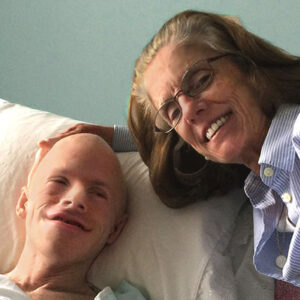A Parent’s Voice
By Dorothy (Dotsy) Zirkle, BSN, CPNP-PC
PhD Candidate, University of Massachusetts Boston School of Nursing
LEND Fellow 2022-2023
Dotsy was a 2022-23 LEND Fellow with the Intellectual and Developmental Disabilities Center and the Rosamund Stone Zander Translational Neurodevelopmental Center
I very much appreciate this opportunity to represent the LEND Fellowship program as a Family Member in the Intellectual and Developmental Disabilities Center and the Rosamund Stone Zander Translational Neurodevelopmental Center at Boston Children’s Hospital for many reasons. I earned my B.S. in Zoology (Pre-Med) in 1975, and B.S.N. Nursing in 1979. I married in 1980 and had our first son, Matthew in 1981. I assumed I would be very capable of caring for a newborn given my nursing background and experience and having cared for my youngest sister with a seizure disorder. Initially I was told Matthew had multiple, what I thought were ‘small’, concerning conditions but I quickly realized there were significant concerns as a geneticist was there for his delivery.
Although we were not formally told of his profound intellectual disability until he was 2 years old, we quickly realized there were significant developmental delays. Matthew started having seizures at 3 months, never sat, crawled, held a bottle, fed himself, and importantly, could not communicate in any decipherable manner. Later feeding problems increased and he had a feeding tube for liquids. However, he was the happiest and most loving child any mother and father could want; he gave so much of his love to my husband and myself and was truly loved. Even though he could not communicate, I learned to read his happiness, pain, and discomfort through his eyes.
In 1981, there was no internet, and I was unable to find any type of information about children with any type of intellectual disability. We visited several geneticists but were not able to receive a diagnosis other than our son was profoundly intellectually impaired. Initially we tried some parent support groups but discontinued attending as we felt most discussions were negatively focused. Other than physical therapy, we had no other interventions suggested for his care.
After we were told by geneticists there was a low chance of having other children with conditions like Matthew’s, we decided to have more children. We had four additional healthy children, two girls and two boys. I erroneously assumed as Matthew grew, I too would grow in strength to adequately care for him (including lifting him) but when Matthew was 8, I could no longer lift him. The state of Oklahoma did not have home-based services available in part due to most services going toward the care and housing for individuals released during the de-institutionalism of The Hissom Memorial Center. We were on a waiting list for home services when Matthew was 7 and did not reach the top until he was 18 at which time, we were able to receive support for services through Medicaid. The resource list of state caregivers was very controversial amid poor care complaints and high turnover rates; we basically were on our own. By the time Matthew was 16 we placed him in a group home, an hour outside of our home, as I could not find care for him, and I was not able to sufficiently care for my children (picking them up at school, grocery shop, taking the children to activities). It was heartbreaking but it was a decision we had to make for our family.
After all my children were grown, and thankfully doing well, I decided to go back to school. Initially I started a program in Public Health receiving a Certificate of Public Health. I then decided to return to nursing school for a master’s in nursing in Boston. I received an M.S. in Nursing in 2011 as a Certified Pediatric Nurse Practitioner with a goal of working with newborns and genetic counselors to help ease the fear and unknowing of new mothers receiving diagnoses of serious conditions. However, after encouragement from an ethics professor, I continued my studies in a PhD Nursing Program in Boston with the clear purpose of finding a way to help families through the process of health care for their loved one with intellectual disabilities. I currently attend the University of Massachusetts Boston, School of Nursing.
Since 2008 my research has focused on how families perceive collaboration and partnership with healthcare professionals during the care of persons with severe-profound intellectual disabilities. I am most interested in families with a nonverbal child/adult in their care. My passion stems from the experiences I had with pain care for Matthew when septic with MRSA post-op spinal surgery. While waiting for Matthew surgery to removal the hardware, I asked for pain medication for Matthew’s excruciating pain. When nursing staff ignored the urgency of my request, I realized that I had to be the ‘voice’ for Matthew and his true advocate for his entire life. Later when Matthew needed intestinal and urinary surgery, we were told by several surgeons they did not see a need ‘to relieve his pain as it would extend his life’ we were shocked. We experienced a great deal of stigma and bias from our community but hearing those words from a medical professional was the absolute bottom, and totally unacceptable.
Although I have worked on my proposal for over 10 years, I remain determined not to give up on giving a voice to families who may encounter frustration with healthcare professionals. Clearly there were and are many doctors and nurses showing tremendous care and respect, unfortunately, some families experience poor collaboration and/or lack partnership with healthcare providers. For these and future families, I hope to provide actionable research results that lead to productive interventions and positive direction for healthcare organizational policy for medical/nursing disciplines. Since starting my PhD journey, I have lost my son, Matthew, and my husband, Kent. Matthew is my driving force for this research, and Kent was my ‘forever’ supporter, even when he was dying, he would not let me give up on my goals.
Through my experience with my LEND program’s placement with the Rosamund Stone Zander Translational Neuroscience Center and Intellectual and Developmental Disabilities Center at Boston Children’s Hospital, I have reached my goal of greater involvement helping other families in need of support, exposure to the unique and complex processes involved with genetics and medicine and observing and learning about the variation in testing leading to a diagnosis. I am beyond thrilled to have this opportunity to learn as much as possible in neurogenetic approaches toward neurodevelopmental conditions.



